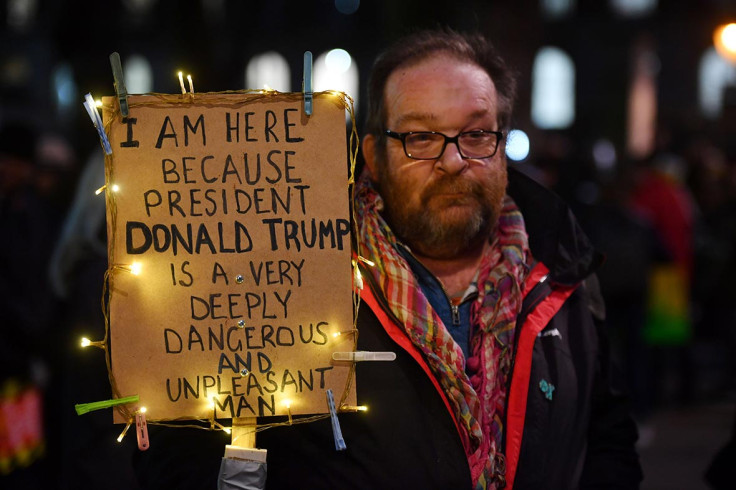Isis will never be defeated if Donald Trump makes an enemy of the Muslim world
His anti-Muslim ban reinforces the belief that the West is at war with Islam.

Donald Trump's executive order banning people from seven Muslim-majority nations from entering the US, including a permanent ban on Syrian immigrants, is many things: it is discriminatory, it unfairly punishes those that are most vulnerable, and according to many Americans, it runs contrary to their country's proud and longstanding immigrant roots.
But it also risks weakening relations between the Western and Islamic worlds – relations that are crucial to addressing some of the biggest challenges facing the world today.
Global co-operation and partnership between the Islamic world and the West are vital to defeating the Islamic State group (Isis) and its ideological affiliates, to finding a lasting resolution to the civil war in Syria and to addressing the global refugee crisis.
Trump's ban, which came just one week into his administration, does nothing to strengthen that much-needed cooperation at a time when the world requires it most. In fact, it has had the opposite effect, given the predictably negative responses from the countries upon whom the ban has been placed and the resultant global outcry.
To compound the problem, the ban plays into the "clash of civilisations" narrative that has been the bedrock of IS propaganda for years. IS's propaganda machinery has long worked to convince Muslims that the West is at war with them. That argument can now be made with unprecedented persuasiveness.
The sum total of all this is to make the ban one of IS's biggest PR victories. After all, destroying the 'grey zone' – the peaceful co-existence of Muslims and non-Muslims – has long been one of the terror group's major strategic goals. The ban, more than anything else, would be used by extremist recruiters to convince Muslims that the West is waging war against not just IS militants in Syria, but against all ordinary Muslims.
The marginalising effect of the ban is aggravated by the fact that it comes on the back of consistent mainstream anti-Muslim rhetoric over the previous years. Hate crimes against Muslims have also risen precipitously in recent years, spiking to a 67% annual increase in the US, according to the FBI's latest crime statistics.
Sunday's (29 January 2017) tragic attack on a mosque in Quebec, Canada, in which six Muslim worshippers were killed and another eight injured, is yet another example of the virulent anti-Muslim hatred that IS and other extremist groups routinely take advantage of.
However, the actions and words of leaders such as Canadian Prime Minister Justin Trudeau, who condemned the attack in the strongest terms and promised that Canada would open its arms to refugees, can help deliver a counter-narrative to the messaging that extremism feeds off.
Just as anti-Muslim sentiment often relies on categorising Muslims as belonging to a single, hostile monolithic bloc, IS similarly frames the west according to a single, simplified negative character trait - in many cases describing Europeans and North Americans simply as "crusaders".
We simply cannot afford to have cooperation between the United States and the Islamic world jeopardised
Behaviours and messages that contradicts that world-view, like that of the Western-world leaders who have spoken out against the ban and in defence of Muslims, helps shatter the sweeping stereotypes that extremists on all sides rely on to make their case. In this we can take some comfort.
Civil society and governments from the West and East have united in their opposition to the ban. German Chancellor Merkel attacked it particularly strongly, saying the "fight against terrorism does not justify a general suspicion against people of a certain belief – in this case people of Muslim belief or people from a certain country".
She added: "that way of thinking is against my interpretation of the basic tenets of international refugee support and cooperation". The French Foreign minister Jean-Marc Ayrault said "terrorism knows no nationality. Discrimination is no response". And the British Foreign Secretary Boris Johnson tweeted: "Divisive and wrong to stigmatise because of nationality".
These responses reflect an appreciation of there being too much at stake for members of the international community to compromise their common humanitarian obligations.
Similarly, in the interests of the Organisation of Islamic Cooperation's 57 member states and the Western world, we simply cannot afford to have cooperation between the United States and the Islamic world jeopardised. There is too much at stake in meeting the major global security and humanitarian challenges of our day.
It is in that acknowledgement of our common challenges and the necessity of cooperation that I hope the US reconsiders this ban and its implications on the long-term strategic interest of not just the United States, but the entire world.
Ms Maha Akeel is the Director of the information department at the Organisation of Islamic Cooperation, the world's second-largest inter-governmental body after the UN with 57 Member States. She is an author and a former journalist.
© Copyright IBTimes 2025. All rights reserved.






















